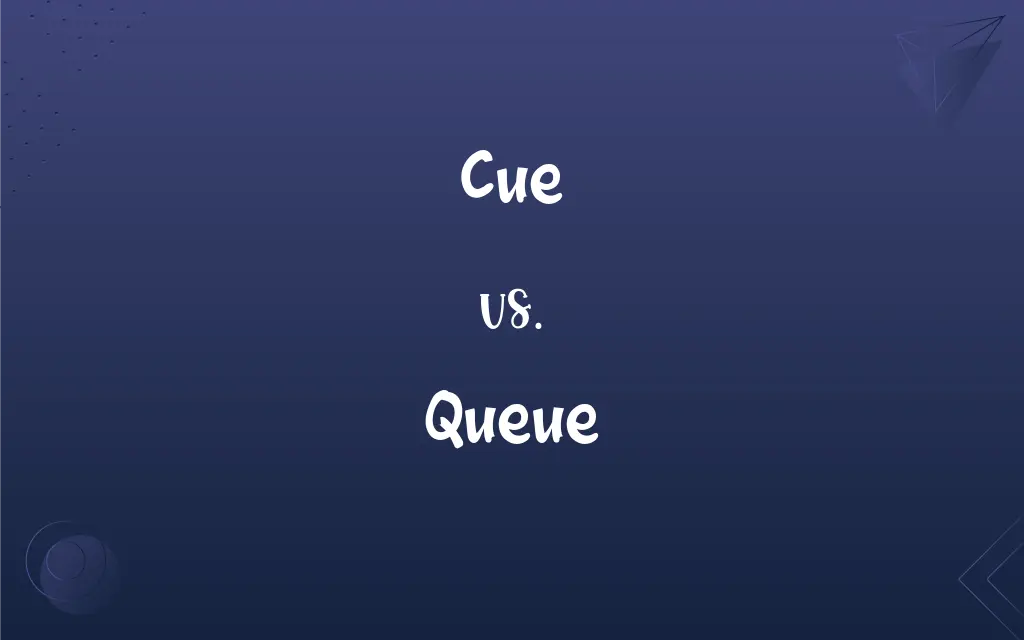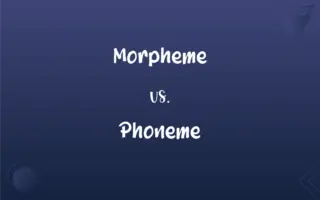Cue vs. Queue: What's the Difference?
Edited by Aimie Carlson || By Harlon Moss || Updated on October 23, 2023
A cue is a signal or prompt, while a queue is a line or list of people or things waiting for their turn.

Key Differences
A cue is typically a signal or indication that prompts someone to take action. In contrast, a queue refers to an ordered line or sequence of people or things awaiting their turn, often in contexts like waiting in line. Both words have distinct meanings and applications.
In the realm of theater and performance, a cue is the signal given to actors or technicians to perform a specific action or line. Meanwhile, a queue in computing or technology can refer to a sequence of data elements stored based on the order they are received and processed in that order.
A cue can also be a physical object, like the stick used to strike the balls in billiards. In British English, when you refer to forming a line, you'd say "forming a queue," underlining the difference between these terms even in day-to-day scenarios.
Another interpretation of cue can be a hint or suggestion, guiding someone towards a particular response. A queue, on the other hand, especially in British contexts, often describes people waiting in line, such as at a bus stop or a cinema.
Comparison Chart
Primary Meaning
A signal or prompt
An ordered line or sequence of people or things
ADVERTISEMENT
Usage in Tech
N/A
A sequence of data elements in computing
Physical Object
Stick used in billiards
N/A
Contextual Usage
Used in theater for performance prompts
Refers to a line of people waiting in British English
Grammar
Often used as a noun, sometimes a verb (to cue someone)
Primarily used as a noun, but can also be a verb
Cue and Queue Definitions
Cue
A signal prompting an action or response.
At his cue, the lights dimmed.
ADVERTISEMENT
Queue
A list of tasks to be processed in order.
Add this job to the render queue.
Cue
A trigger for a line or action in theater.
The actor missed his cue and entered late.
Queue
An ordered line of people waiting for something.
There was a long queue at the ticket counter.
Cue
A stick used in games like billiards.
He selected a cue from the rack to start the game.
Queue
A sequence of data items awaiting processing.
The print queue was backed up with pending jobs.
Cue
A reference or basis for a discussion or thought.
The documentary provided a cue for a deeper conversation about climate change.
Queue
To arrange or line up in order.
People began to queue up for the movie premiere.
Cue
A hint or indication guiding behavior.
She took the laughter as her cue to continue the joke.
Queue
A braid of hair worn at the back.
The soldier sported a queue, a common style in the 18th century.
Cue
A long tapered stick with a leather tip used to strike the cue ball in billiards and pool.
Queue
A line of waiting people or vehicles.
FAQs
What does it mean to queue up?
To queue up means to line up or wait in sequence for one's turn.
Can "cue" be used as a verb?
Yes, "to cue" can mean to provide a signal or prompt for someone.
How is a queue related to computers?
In computing, a queue refers to a sequence of data items stored for processing based on the order they're received.
What is a cue in theater?
A cue in theater is a signal for an actor or technician to perform a specific action or line.
Do queues always move forward?
Generally, yes. A queue progresses as individuals or items at the front are processed or served.
What does it mean to take one's cue from someone?
It means to follow someone's lead or guidance.
Can "queue" be used as a verb?
Yes, "to queue" can mean to line up or arrange in order.
Can music have cues?
Yes, in music, a cue can indicate when a musician should start playing.
Is waiting in a queue always physical?
No, virtual or digital queues exist, such as when waiting on hold on a call or in online systems.
What's a queue in terms of hair?
A queue can refer to a braid of hair worn hanging at the back of the head.
What's another word for cue in the context of a hint?
Another word for cue as a hint might be "clue" or "indication."
How long might a queue be?
A queue can be any length, from a few individuals to a long line extending several blocks.
Can a gesture be a cue?
Yes, gestures can act as non-verbal cues, prompting certain responses or actions.
Are queues always orderly?
Ideally, yes, but queues can become disorderly without proper management or in crowded conditions.
Is a cue always related to performance?
No, a cue can also be a hint, suggestion, or any signal prompting action.
Can you give an example of a queue in everyday life?
A line of people waiting at a bus stop is a common example of a queue.
Why do we sometimes hear "queue up the music"?
It's a colloquial way to say "prepare the music to be played," combining elements of both "cue" and "queue."
Is a prompt similar to a cue?
Yes, a prompt is very similar to a cue, indicating when an action should be taken.
Can animals understand cues?
Yes, many animals can be trained to respond to specific cues or signals.
Is a cue stick only used in billiards?
While commonly associated with billiards, cue sticks are also used in other games like snooker.
About Author
Written by
Harlon MossHarlon is a seasoned quality moderator and accomplished content writer for Difference Wiki. An alumnus of the prestigious University of California, he earned his degree in Computer Science. Leveraging his academic background, Harlon brings a meticulous and informed perspective to his work, ensuring content accuracy and excellence.
Edited by
Aimie CarlsonAimie Carlson, holding a master's degree in English literature, is a fervent English language enthusiast. She lends her writing talents to Difference Wiki, a prominent website that specializes in comparisons, offering readers insightful analyses that both captivate and inform.































































